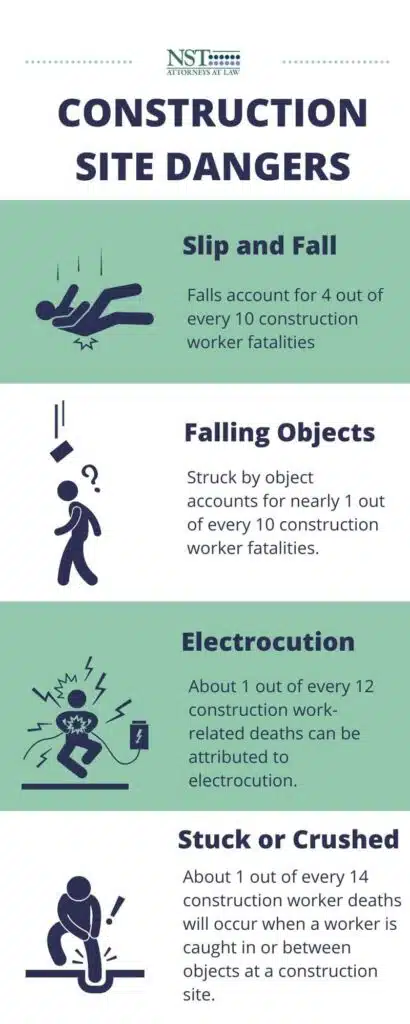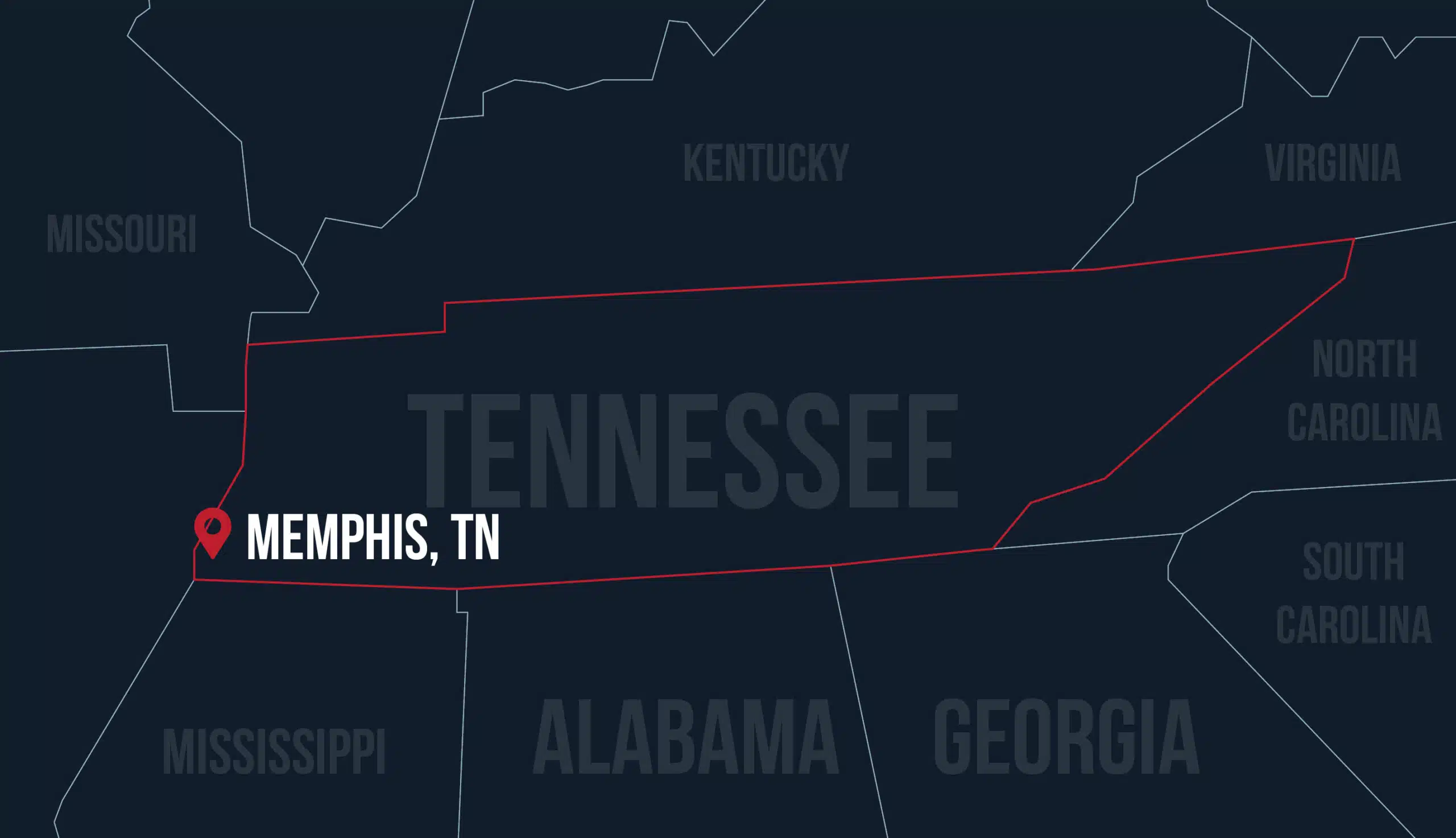
Memphis Construction Accident Lawyers

At NST Law, we are dedicated to helping injured individuals and their families get the justice and compensation they deserve.


Expertise
Mr. Trotz has handled injury cases involving auto accidents, slip and fall, premises liability, and negligent security. Every day, Mr. Trotz represents those who have been injured and many of his clients have sustained traumatic and life-altering injuries.
Injured construction workers may be entitled to recover compensation through workers’ compensation and a personal injury lawsuit. The Memphis construction accident lawyers at NST Law can identify all liable parties and ensure you recover all the compensation and benefits to which you are entitled.
Construction work is one of the most hazardous occupations, with 31 fatal accidents reported in Tennessee in 2019, according to the Bureau of Labor Statistics. This is in addition to 1,230 non-fatal accidents resulting in injury, as reported by the Tennessee Department of Labor and Workforce Development.
These injuries can be debilitating and costly. The Memphis personal injury attorneys at NST Law can help injured construction workers recover the compensation they need for medical treatment and financial security.
- NST Law Is The Law Firm Of Choice For Memphis Construction Accident Injuries
- Testimonials from Our Memphis Clients
- Who Is Liable For My Construction Worker Injuries?
- What Types Of Compensation Are Available For My Construction Injuries?
- What Are The Most Common Construction Accidents?
- What Steps Should I Take After A Construction Accident?
- Memphis Area Hospitals
- How Much Does A Memphis Construction Accident Attorney Cost?
- When Should I Contact A Memphis Construction Accident Lawyer?
- How Can A Construction Accident Attorney Help Me With My Injury Case?
Nst Law is the Law Firm of Choice for Memphis Construction Accident Injuries
Injured construction workers can count on the attorneys at NST Law to provide fierce advocacy and support during the difficult time following an injury.
Our compassionate attorneys are champions for the injured who provide personalized services while leveraging the vast network of resources we have built over the 32 years since our establishment.
While we cannot restore health, we are committed to pursuing maximized support for each client.
Every client is important to us, and our clients can count on us to be transparent and accessible in keeping with our Six Pillars. These values have helped us achieve outstanding results for our clients, such as the following:
- $950,000 settlement for a man who fell from a catwalk while at work
- $925,000 for an ethanol plant worker struck by a locomotive engine at work
- $970,201.58 for a logistics worker who suffered a severe ankle injury at work
These results are more than just numbers to us. Each represents a difference we were able to make in the life of an injured worker who had, in many cases, lost everything due to their injuries.
NST Law is dedicated to improving the lives of the residents of Memphis and the surrounding areas by providing skillful representation for injured individuals as well as supporting charitable organizations that promote diversity, inclusion, and opportunities for low-income individuals and families.
Testimonials from Our Memphis Clients
The team has Phenomenal knowledge and experience and will work to get you the results you deserve and more. Thanks so much Nahon, Saharovich & Trotz for your amazing service. Steven is the best ever. Thanks so much for making me feel so comfortable.
Who is Liable for My Construction Worker Injuries?
Construction injuries can occur as a result of negligence by the following:
- Drivers of motor vehicles
- Defective product manufacturers
- Contractors
- Mechanics
- Premises owners
These parties may be liable if their negligence caused or contributed to your injuries. Although your employer or a co-worker may also have caused your injuries, they cannot always be held liable. Instead, you may have grounds to file a workers’ compensation claim.
What Types of Compensation Are Available for My Construction Injuries?
Most construction injuries are covered by workers’ compensation, but there are some circumstances in which you are eligible to file a lawsuit.
Workers’ Compensation
All construction companies are required to carry workers’ compensation insurance. Regardless of how your employer classifies you for income tax purposes, if you work exclusively for one employer and that employer controls your hours and wages, you are most likely an employee for workers’ compensation purposes.
Workers’ compensation provides advantages to the employer and the employee. For employers, it provides protection from further liability. For employees, it provides the following:
- Immediate access to medical care
- Monetary benefit payments that must commence within 15 days of the injury
- The ability to receive benefits without the obligation to prove your employer was negligent
- Coverage for work-related injuries and illnesses that stem from long-term exposure to hazardous conditions
Employees have the right to enlist the help of an attorney for the filing of their workers’ compensation claims.
Medical Care
Workers’ compensation provides free medical care for injuries or illnesses that are tied to the claim.
Can I choose my own doctor?
Yes and no. Your employer is required to provide you with a panel of three doctors from which to choose. The only exception is the emergency treatment you receive for your injury, in which case your employer should reimburse you.
Can I get a second opinion?
Workers’ compensation typically does not cover second opinions, but you can pay for a second opinion out of your own pocket or with your own insurance if you disagree with the initial doctor’s assessment.
Are there co-pays?
You receive 100 percent coverage with workers’ compensation with no co-pays or deductibles.
Can my medical travel expenses be reimbursed?
The cost of travel is included in workers’ compensation coverage when you must travel a distance of 15 miles or more.
Partial Wage Replacement
In addition to medical care, workers’ compensation provides weekly payments equal to two-thirds of your most recent income based on your average income during the past year. These payments are known as disability payments, and they can be temporary or permanent.
Temporary Disability
Temporary disability is an impairment from which you are expected to recover but lasts longer than seven days. Temporary disability payments are paid until your condition no longer prevents you from returning to work.
Permanent Disability
A permanent disability is an impairment from which you are not expected to recover. This is determined when your doctor confirms that the maximum medical approval is reached. The two types of permanent disability are:
- Partial Disability – A disability that allows you to perform some work, but not the same work you could do before
- Total Disability – A disability that prevents you from working altogether
The disability award is the same whether the disability is permanent or temporary, with the exception of partial disability. Partial disability payments deduct the amount you are able to earn from your award.
Death Benefits
Workers’ compensation offers death benefits to the family or estate of the deceased worker as follows:
- $10,000 for burial expenses
- Weekly payments to dependents equal to two-thirds of the weekly wages during the most recent year of the workers’ covered employment
- If there are no dependents, a lump sum of $20,000 to the employee’s estate
Workers’ Compensation Limitations
Workers’ compensation has the following limitations:
- Covered workers cannot sue their employer or co-workers.
- Non-economic damages are not available.

Personal Injury Lawsuit
If you are not a covered worker or if an outside party caused or contributed to your injuries, you may have grounds for a personal injury lawsuit.
How much can I recover in a construction lawsuit?
In a personal injury lawsuit, you may be able to recover economic damages, non-economic damages, and punitive damages.
Economic Damages
Economic damages are verifiable, monetary losses that stem from the injuries. They include the following:
- Medical expenses
- Lost earnings
- Loss of earning capacity
- Property damage
Non-Economic Damages
Non-economic damages are subjective damages related to non-monetary losses and may include the following:
- Pain and suffering
- Loss of bodily functions
- Loss of consortium
- Loss of society
- Disfigurement
Punitive Damages
Punitive damages are rare, but they are awarded in cases where the defendant’s conduct leading to the injury was deliberate or demonstrated a flagrant disregard for safety.
Wrongful Death Lawsuit
In the tragic death of a family member while at work, a wrongful death lawsuit may be available if the worker was not covered by workers’ compensation or if liable parties outside the employer can be identified.
Damages available in a wrongful death lawsuit are similar to the damages available in a personal injury lawsuit, but also include the following:
- Funeral expenses
- Burial expenses
- Loss of companionship
- Loss of guidance or support
What Are The Most Common Construction Accidents?
The following Memphis workplace accidents were reported to OSHA for the calendar years 2017 through 2022:
- Fall from roof
- Crushing injuries from MDF panels and a drywall cart
- Fall from a stepladder
- Two deaths from electrical shock
- Fall from a roof
These tragic and preventable incidents are consistent with the most common causes of construction injuries:
- Electrocution
- Struck-by and crushing injuries
- Falling objects
- Stuck between objects
- Slips, trips, and falls
- Burns

What Steps Should I Take After a Construction Accident?
- If it is an emergency, seek immediate medical care.
- If you are able, take pictures of any conditions that contributed.
- Make a list of witnesses.
- Report the injury to your employer immediately.
- Follow through with all medical treatment.
- Contact an attorney as soon as possible.
Memphis Area Hospitals
Memphis is home to several high-performing hospitals and trauma centers:
- Regional One Health System – Houses the Elvis Presley Level I Trauma Center
- Regional Medical Center – Comprehensive care hospital located in the Memphis Medical Center on Jefferson Avenue
- Methodist North – A full-service community hospital located in Northeast Shelby County
- Methodist South – A full-service community hospital in Whitehaven serving South Memphis and the surrounding areas
- Baptist Memorial Hospital
- St. Francis
How Much Does a Memphis Construction Accident Attorney Cost?
Our law firm operates on a contingency basis. This enables injured individuals to access quality legal counsel without the necessity of massive financial resources. A contingency fee arrangement also gives us an added incentive to give your case our undivided attention. If you don’t get paid, neither do we.
Our law firm also provides a free case evaluation, which means you risk nothing from an initial consultation. Schedule yours today to ensure you get a champion for your cause as soon as possible. Don’t let time run out. Contact the champs today for a FREE case review.
When Should I Contact a Memphis Construction Accident Lawyer?
It is important to contact a Memphis construction accident attorney as soon as possible after your accident. The state of Tennessee imposes strict deadlines on workers’ compensation claims, and early attorney involvement can ensure your attorney has time to prepare your case ahead of the deadline.
If you are filing a lawsuit, the Tennessee statute of limitations is just one year in most cases. This is a short time limit, and your attorney will need as much time as possible to prepare your case.

How Can a Construction Accident Attorney Help Me With My Injury Case?
Workers’ compensation is a form of insurance. Insurance companies are large businesses that have the advantage of vast resources combined with years of experience to minimize compensation. These companies are adverse to you, and without a competent workers’ compensation or third party liability attorney, you are at a disadvantage.
A workers’ compensation attorney at NST Law will match or exceed the skills and experience of the insurance company and their attorneys while serving your interests.


Contact us for a free consultation now so that we can review your case and decide how we can best help you.
 Skip to content
Skip to content





